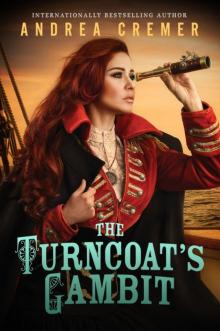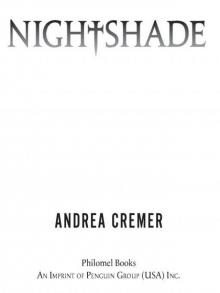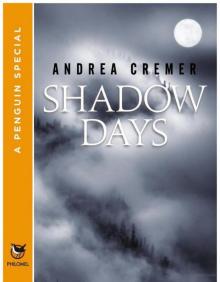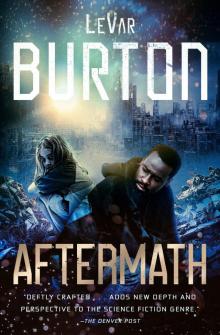- Home
- Andrea Cremer
The Turncoat's Gambit Page 8
The Turncoat's Gambit Read online
Page 8
She didn’t answer.
“My own men are wise enough to fear me,” he told her. “Considering your current position, it might serve you better to do likewise.”
His condescension disgusted Charlotte. “If I tremble and weep, will you set me free? I think not.”
“Freedom is not within your reach, Lady Marshall,” Winter said. “But a conciliatory attitude could improve your circumstances considerably.”
Having expended what little energy she’d had, yet wanting to show strength, Charlotte leaned against the wall for support. The world had shifted beneath her, toppling all she believed to be real, making her dizzy, weakening her knees.
“Perhaps you need further motivation to develop the proper rapport with me.” Admiral Winter turned to the guards.
“Blackwell will stay,” he continued. “Commodore, see to your orders.”
Coe and two guards saluted Admiral Winter and exited the cell.
“I regret that we’re meeting under these circumstances,” the admiral said to Charlotte. “Though I am pleased you’ve had the chance to experience the Crucible—it offers an appropriate lesson.”
“I’m not a schoolgirl,” Charlotte said. “Stop speaking to me as though you’re some kind of teacher.”
“But you do have so much to learn,” he replied with a chilly smile. “For instance, we needn’t be adversaries. It’s true that you have much to lose here, but you also could make surprising gains.”
His smugness filled Charlotte with disgust.
“Youth is like being carried through life by a strong current,” Admiral Winter said. “All you feel is the speed of the river, the thrill of rapids, never comprehending your utter lack of control, your constant peril.”
“You talk too much,” Charlotte muttered.
His veneer of unshakeable certitude wavered, slipping to reveal a flash of outrage in his eyes, and Charlotte thought he would strike her. Instead, Admiral Winter calmed himself by uttering a disdainful laugh.
“If you prefer a demonstration to words, so be it.”
The silence that followed left Charlotte more unnerved than anything he’d said thus far, and she regretted provoking him. The admiral remained mute, stretching the strained quiet that enhanced the threat of his words until Charlotte wanted to twitch with discomfort.
Admiral Winter’s smile provoked an instinctive shiver in Charlotte’s limbs. He looked over his shoulder at the figures who hovered outside the door.
“Bring him in,” Admiral Winter said.
The guards had returned, this time supporting a man between them. The man’s head was slumped, his hair shaggy. His legs moved in a semblance of walking, but his body was as limp as a rag doll’s, his limbs skeletal. Charlotte’s mouth went dry. Was this the fate of the Crucible’s imprisoned?
“Good afternoon,” Admiral Winter walked up to the prisoner. “I have someone here I’m sure you’ll be pleased to see.”
The prisoner’s head was still bent. A sound like a rasp came from his throat.
“Get him some water,” Coe quietly told one of the guards.
When the guard released the man, he teetered on his feet but didn’t fall.
Horror and pity choked Charlotte as she watched the poor man. The guard returned with a cup of water. He held it up to the man’s lips. The prisoner didn’t drink so much as slurp and cough in a way that made Charlotte wonder how rarely he was provided water to drink.
“Now, then,” the admiral said. “Say hello to our guest.”
The man slowly lifted his face. A matted beard hid many of his features, but not enough to stop Charlotte from gasping and then giving a broken cry.
“Father?”
Charles Marshall had aged like Charlotte’s mother, but also differently, not just in the passing of years. Whatever time he’d spent within the cells of the Crucible had drained his life away. He looked more like the husk of a person than a man. He stared at Charlotte, his eyes haunted.
“No,” he whispered. “No. Please no.”
He began to weep. A coughing fit overtook him.
Tears dampened Charlotte’s cheeks as well, her emotions a maddening contrast of sorrow and joy. When Caroline Marshall had told Charlotte her father was gone, Charlotte had assumed that meant dead. But he was alive! Only the life he’d been sentenced to might have been worse than death.
How long had he been here? When was he captured? Why hadn’t her mother told Charlotte and Ashley the truth? She wanted answers, but had no one to offer them.
Maybe their mother didn’t know. Perhaps she thought Charles had been killed in battle when in fact he’d been captured.
Her thoughts were dizzying, but Charlotte still walked toward her father, wanting to hold his hands. To offer some comfort.
Coe stepped into her path and grabbed her arm. “No.”
“Let go of me,” Charlotte snapped, trying to free herself.
“He’s ill,” Coe told her. “You shouldn’t touch him.”
Charlotte stopped trying to free her arm. “How ill?”
It was Admiral Winter who answered. “Consumption.”
A sickness that was almost always a death sentence, especially without treatment.
Still weeping and coughing, Charlotte’s father no longer had the strength to stay on his feet. His legs buckled, and he fell to the floor.
“Take the prisoner back to his cell.” Admiral Winter watched Charles with open revulsion.
Charlotte didn’t bother to argue. Begging for her father to stay in the room would have been selfish. The exertion of movement paired with the emotional trauma of seeing his daughter in the Crucible would already be taking a horrible toll on his health. Charlotte didn’t know if her father would even believe he’d truly seen her, or if he’d come to believe she had been a fevered hallucination. Or a cruel trick concocted by his captors.
The door clanged shut, leaving her alone with Admiral Winter and Coe once again.
Tears still came from Charlotte’s eyes, but she kept her voice from shaking. “Are you happy? Did it bring you joy to watch both of us suffer?”
“I’m not a sadist, Lady Marshall,” Winter said. “I merely wanted you to be aware of the reality of your situation. And of the choices that lie before you.”
“What choices?”
Admiral Winter smiled at her. “There are always choices, but given how you were raised, it makes perfect sense that you wouldn’t accurately perceive your options. Allow me to draw back the veil.”
He placed his hand on Coe’s shoulder. “My elder son offers a fine example of what I want to convey to you. You believe in the Resistance. Why wouldn’t you? It’s all you’ve known. You were raised in seclusion, shut away from the world and taught only the lessons that would benefit the Resistance.”
Charlotte listened, reviling him but keeping silent.
“The allure of the Resistance reaches beyond its own children. The youth of the Empire, seeking their fortunes, testing the bounds of authority, can become entranced by the myths of liberty and defiance.”
Looking at Coe, the admiral sighed. “Neither of my sons could resist that siren song. I blame myself for being absent through their childhood. My duties required that it be so, but I should have been more vigilant. Instead I presumed loyalty.”
Coe flinched slightly. He glanced at Charlotte, and she saw dread in his eyes. Whatever his father was about to say, Coe didn’t want Charlotte to hear it. But Admiral Winter didn’t continue his story, instead shifting his gaze to Coe.
“Commodore, why don’t you tell our guest why you ultimately returned your allegiance to the Empire.”
Coe’s Adam’s apple shifted as he swallowed.
Observing his son’s hesitation, the admiral said, “No need to wallow in shame. Those mistakes are in the past. You’ve been redeemed.”
>
After clearing his throat, Coe looked at Charlotte. “I’d been supporting the Resistance for a little over a year when my involvement with the rebels was discovered.”
“By whom?” Charlotte asked, caught off guard by this revelation. Coe hadn’t joined the Resistance as a mole. He’d been compromised.
Coe didn’t answer, but turned his gaze toward his father.
“One can never be too careful with secret correspondence,” Admiral Winter said, favoring Coe with a pitying smile. “Rather than making my son’s unsavory alliance with the enemy public, I found more efficacy in turning his errors to the benefit of the Empire.”
He gestured for Coe to continue.
“My father offered me a choice. Die for the Resistance or become a hero of the Empire.”
You should have died. Charlotte didn’t voice her thought, but Coe read it on her face.
“Of course you condemn me, think me a coward, but I didn’t return my fealty to my father and Britannia to save my life,” he said.
Watching Charlotte’s expression fill with contempt, Coe went on. “When I first joined the Resistance, I believed in it. I was happy to call the Empire tyrannical and was ready to struggle to overthrow coloznial oppressors. But once I was inside the Resistance and assessed its capabilities—militarily and politically—I knew the entire movement was doomed. This was no true movement. It was desperation. I knew the strength of Britannia—I’d inhabited its upper echelons my whole life. The leaders of the Resistance are deluded to think they could ever triumph against the Empire’s might. All they do is beg crumbs from the French and offer one another platitudes about their righteous cause.”
Charlotte couldn’t react. Her emotions were too volatile. Rage churned in her blood; she was sickened by Coe’s tale. But worst of all, a small part of her was fearful. What if his description of the Resistance was the truth?
“I believe the only hope for a strong, thriving society depends on the survival of the Empire and its unimpeded expansion. My father could have executed me or sent me here to wither away, forgotten. But he chose another option: he raised me up and gave me new life, new hope, new purpose. He created a way by which I could be absolved of my sins, to be redeemed in the eyes of the Empire. To become its champion and destroy its enemy by devouring it from within.”
Charlotte shuddered at the words new life. “Athene help us . . . Lazarus. You’re Lazarus.”
She didn’t want to believe, but the moment she’d spoken, she knew it was true. A high-ranking officer of the Empire sympathetic to the Resistance. Part of the story was true, but it didn’t end where the Resistance believed it did. Admiral Winter had created Lazarus by leveraging Coe’s guilt and fear. If Lazarus was working for the Empire, then everything the Resistance had built its strategies upon—counterintelligence, the secrecy of its own plans, the strength of its ranks—could not be trusted. It was all a lie.
“Coe speaks of your cleverness and strength,” Admiral Winter said. “Those are qualities I value. That’s why I want to offer you a second chance, as I did my son.”
Charlotte opened her mouth to spit a rejection at him, but he held up a warning hand.
“You want to hear what I have to say.”
She waited, though her limbs were still trembling with outrage.
“Your father is not beyond hope,” Admiral Winter told her. “The Empire has exceptional practitioners of physic as well as the skill of healers from the Temple of Athene. Nothing would be held back in our attempt to restore your father’s health . . . if you accept my offer.”
Charlotte could hardly breathe. Her body quaked with indecision.
Her father might die from his illness no matter what she did. But could she take that chance, knowing that there was a possibility his life could be saved?
And what to do with the terrible knowledge she’d gained? Impossible as it seemed, she had to get word to the Resistance about Coe’s treachery. If she failed to do so, it was only a matter of time before the Empire played a winning hand from its stacked deck and annihilated the Resistance. There was nothing she could do from the Crucible. No escape. She had to find a way out of this place and to get somewhere that she could be found or that offered even the slimmest chance to slip away.
Charlotte had no doubt that Jack would eventually free himself, but would he try to track Charlotte and Grave or would he seek help? He wouldn’t go back to New Orleans to contend with Caroline Marshall, even if Ash was there. If Jack contacted Coe, then Jack would only be misled. But if he went to Linnet and Meg for help, they would surely take action. Still, coming to the Crucible would be suicide. There had to be something Charlotte could do to help her friends even in her current predicament. She didn’t know how much time she had.
“I do want to save my father,” Charlotte said.
“I would have been disappointed if you didn’t,” Admiral Winter replied.
“What do you want from me?” Charlotte asked.
“In order to proceed with Grave, we need him pacified.” The admiral folded his arms behind him and paced in front of her like an officer inspecting a regiment. “He hasn’t tried to escape because we hold the threat of harming you over him.”
“And that’s not enough?” Charlotte snapped. She hated being the key to Grave’s manipulation, but so far she couldn’t think of any way to counter Admiral Winter’s maneuver.
“In the Crucible it is,” he answered. “But we’ll soon be leaving for the Floating City, where our work with Grave will truly begin. The Crucible is a place for destruction, not discovery. The experts and facilities we need to fully understand him are in New York. Moreover, I’m hopeful that Grave—and you—will take the change of location as a show of our aims. You will continue to be his traveling companion, and you must ensure that Grave cooperates fully with us.”
“No.” Charlotte cringed inwardly, not wanting to envision what assignments Admiral Winter had planned for Grave. “Not even for my father.”
She closed her eyes, silently begging his forgiveness and Athene’s mercy for having to choose.
“Since you are willing to sacrifice your father for Grave”—the heels of the admiral’s boots snapped together when he turned to look directly at her—“I’m certain you’d also be willing to sacrifice yourself.”
Charlotte didn’t respond.
“However,” Admiral Winter went on, “you would be foolish to think holding Grave indefinitely is worthwhile to our purpose. His utility extends so far as he can serve us. If he isn’t actively supporting the Empire, then our only recourse is to prevent his ever returning to the hands of the Resistance.”
“You can’t kill him.” Charlotte sniffed in disdain.
“I know there are ways he cannot be killed,” he replied, his eyes cold. “But by no means have we exhausted the ways that could be attempted. Do you think Grave would survive the heat of the Great Forge? Or bombardment by our air fleet?”
Charlotte had to pull her gaze off him. She didn’t know the answer to those questions.
The assured quality of Admiral Winter’s tone made her hate him all the more, because he could see he had Charlotte cornered. “You’ve already shown your willingness to defy the Resistance by spiriting Grave away from New Orleans. What more harm can be done by simply ensuring his survival in New York?”
There was only a hint of truth in what the admiral said. Knowing that Grave wasn’t resisting imprisonment was far from telling him to aid the Empire. Some other course had to exist, but for now Charlotte couldn’t find it. What she needed was time.
“Very well.”
Admiral Winter’s smile could have belonged to Hades himself.
“Excellent,” he said. “I’ll arrange for transport. You’ll be provided with clean clothing and food. It’s important that Grave knows you’re not being mistreated.”
Charlotte chose not to res
pond. She could barely keep her feelings in check as it was.
“You’ll speak with him before we leave.” Admiral Winter walked toward the door. “Be certain he understands both his and your situation.”
She nodded.
“Till tomorrow, then.” He stepped out of the cell and was gone.
Coe looked at her, his face pained. “Charlotte—”
“Don’t speak to me,” she said. “What you’ve done is unforgivable.”
“If you’d let me explain.” Coe took a step toward her.
“No.” Charlotte raised her fists, making it clear she’d attack if he came any closer. “No more lies.”
He gazed at her a moment, then breathed a long sigh before he went to the cell door. Looking over his shoulder at her, Coe said, “I’m sorry it had to be this way.”
Then he was gone, too.
12.
GRAVE STARED AT her with his unusual rust-colored irises. Silent.
Guards had arrived at Charlotte’s cell as daylight began to seep in through the slit in the wall. They’d taken her, hooded, to a barracks. The hood was removed, and Charlotte was left in a room with a tub of cold water to wash, clean underclothes, and a simple dress. A plate of bread, cheese, and fruit served as Charlotte’s breakfast.
Coe brought Grave to the room, ushering him to a chair opposite Charlotte. She was glad to see that, like her, Grave was no longer bound. He appeared calm, and he smiled at Charlotte when he sat. Coe then walked a short distance away, giving a semblance of privacy without moving out of earshot. His presence limited what Charlotte could say, but she hadn’t expected she’d be allowed to see Grave without supervision.
Doing her best to convey the duress she was under, Charlotte kept her message plain. They would accompany Coe and his father, Admiral Winter, to the Floating City. While they were in Admiral Winter’s care, they were to do all he asked without question.
While she spoke, Charlotte was horribly aware of all the things she wanted to say. She couldn’t warn Grave that his life was in peril. She wanted to tell him to run. To forget about protecting her, to discard his unflagging loyalty. She wondered if he’d even listen, were she free to speak her mind. All Charlotte could hope for was that Grave took her simple commands and understood the greater meaning of the silence, of all that was left unsaid. Grave had always been strange, but his mind wasn’t feeble. He had to know that her choices were limited. Grave trusted her. But did he trust her enough to know that if she was putting him in harm’s way now, she did so only because it offered the means to save them both later?

 Wolfsbane
Wolfsbane The Conjurer's Riddle
The Conjurer's Riddle Rift
Rift Snakeroot
Snakeroot The Turncoat's Gambit
The Turncoat's Gambit Nightshade
Nightshade Bloodrose
Bloodrose Rise
Rise Shadow Days
Shadow Days Treachery
Treachery Aftermath
Aftermath Aftermath: A NightShade Novella
Aftermath: A NightShade Novella Rise: A Nightshade Novel
Rise: A Nightshade Novel Invisibility
Invisibility